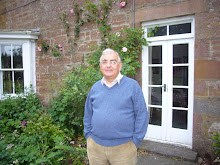
I smelt it before I saw it. The heron had been dead several days, lying hidden amongst the long grass by the roadside. I don't think I've come across a dead one before, and the process of decomposition was quite advanced. His - or perhaps it was her - eyes were crawling with tiny flies and even the dogs were put off by the rotting smell. But it's nature doing what nature does. The dead body will support all sorts of insects and worms and grubs, and before long only a pile of slate grey feathers will tell the tale that something that lived has been reclaimed.
In old Celtic mythology the heron was regarded as a bird of ill-omen. Perhaps it's the way it stands with its head hunched into its shoulders, looking as though it's contemplating villainy or evil. The novelist DK Broster in her classic Scottish novel "The Flight of the Heron", based on the 1745 Jacobite Uprising, describes how it was considered unlucky in those days to meet a heron when you set out on a journey. It all seems a bit hard on a bird that is shy and withdrawn.
There may be dignity in dying but, looking at that corpse, there's no dignity in death.

No comments:
Post a Comment